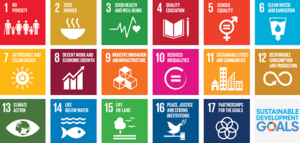|
Getting your Trinity Audio player ready...
|
The Sustainable Development Goals (SDGs) were adopted by all United Nations Member States in 2015 as a universal call to action to end poverty, protect the planet, and ensure prosperity for all. In Africa, these goals have become a critical roadmap to address the continent’s pressing challenges and achieve sustainable development. This article explores how the SDGs are shaping Africa’s development agenda, their impact on resolving issues, and the progress made so far.

Goal 1: No Poverty
The first SDG aims to eradicate extreme poverty in all its forms. In Africa, poverty remains a significant challenge, affecting millions of people. Efforts to achieve this goal focus on improving access to basic services and fostering inclusive economic growth. Governments, NGOs, and international organizations collaborate to design poverty reduction strategies tailored to each country’s specific needs.
Goal 2: Zero Hunger
Achieving food security and improving nutrition are the key objectives of this SDG. In Africa, where many countries face food crises and malnutrition, this goal is of utmost importance. Climate-smart agriculture and community-based food security programs have been successful in enhancing food resilience and reducing food insecurity.
Goal 3: Good Health and Well-being
In Africa, healthcare systems face various challenges, including limited infrastructure and inadequate access to quality healthcare. Efforts to achieve this goal focus on improving healthcare services, strengthening disease prevention programs, and enhancing healthcare capacity to respond to epidemics and health emergencies. Investment in primary healthcare, vaccination campaigns, and disease surveillance has contributed to significant progress in reducing child mortality and improving maternal health.
Goal 4: Quality Education
This SDG aims to provide inclusive and equitable quality education for all. Education is crucial for Africa’s development, as it empowers individuals and promotes economic growth. To achieve this goal, investments are made to improve education infrastructure, teacher training, and access to education for marginalized populations, particularly girls and children in rural areas. Community schools and mobile learning initiatives have expanded educational opportunities for underserved communities.
Goal 5: Gender Equality
Gender equality is a cornerstone of sustainable development. SDG 5 aims to end discrimination and violence against women and girls while promoting their empowerment and equal opportunities. In Africa, efforts are made to eliminate gender-based barriers, promote women’s leadership, and ensure access to education, healthcare, and economic opportunities. Initiatives such as gender-responsive budgeting, women’s entrepreneurship support, and awareness campaigns against gender-based violence have contributed to progress in achieving gender equality.
Goal 7: Affordable and Clean Energy
This SDG seeks to ensure access to affordable, reliable, sustainable, and modern energy for all. In Africa, where many communities lack access to electricity, the focus is on developing renewable energy sources, expanding energy infrastructure, and increasing energy efficiency to accelerate progress toward universal energy access. Off-grid solar projects, mini-grids, and investments in renewable energy have brought electricity to remote and underserved areas.
Goal 9: Industry, Innovation, and Infrastructure
In Africa, stakeholders are actively improving transportation networks, expanding ICT access, and supporting industrial development to boost economic growth and create jobs.
Goal 10: Climate Action
Addressing climate change and its impacts is crucial for Africa’s future. SDG 13 seeks to take urgent action to combat climate change and its effects. African countries focus on building climate resilience and promoting renewable energy. Also implementing adaptation strategies to protect vulnerable communities from climate-related challenges.
Conclusion
The Sustainable Development Goals provide a comprehensive and interconnected roadmap for resolving issues and achieving sustainable development in Africa. These goals address critical challenges such as poverty, hunger, health, education, gender inequality, and climate change. Governments, civil society organizations, and international partners work collaboratively to implement targeted strategies and interventions to drive progress. While significant strides have been made, challenges remain, and sustained efforts and partnerships are essential to achieving the SDGs.